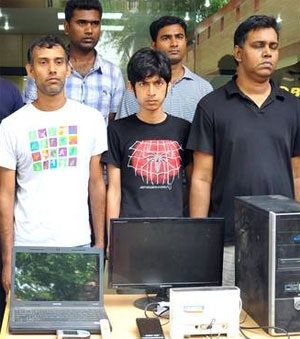Religion
Atheism Shouldn't Be a Crime
Blasphemy should be celebrated, not outlawed
Posted April 10, 2013
If you think it’s rough being an atheist in America, consider the situation in less open societies. In Bangladesh, for example, several atheist bloggers were recently arrested and dozens of others face possible charges. Their crime, although described in various ways (including “insulting religion”), appears to be nothing more than being openly atheist.
The International Humanist and Ethical Union (IHEU) via an action alert and other measures, is trying to raise public awareness of troubling anti-atheist developments in Bangladesh and elsewhere. Around the world, enforcement of blasphemy laws, sometimes described as “defamation of religion,” is threatening fundamental freedoms of conscience and expression, thereby making religious dissent, especially in the form of open atheist activism, very dangerous. (Some blasphemy laws call for the death penalty.) American secular groups are working with the IHEU, and plan to take steps, including possible protests and demonstrations, to call more attention to the issue. (Follow my Twitter feed for updates on these activities.)

Bloggers charged. Photo from IHEU web site.
Interestingly, mainstream American media have given little coverage to this issue, even though it presents a plain case of indefensible repression of not just one basic freedom, but several: freedom of religion, free speech, freedom of conscience, and even free press (if we consider blogging as a form of press). Guilty of little more than standing up publicly as atheists, these criminal defendants go unnoticed in the media of the free world. Where is the outrage?
Nothing is more repugnant to freedom of conscience than the notion that some ideas – whether religious, political, or philosophical – are beyond criticism. Thus, it's not surprising that we see countries governed by religious fundamentalists claim that “defamation of religion” must be discouraged. Perhaps more concerning, however, is that the idea of defending religion is gaining traction in some unexpected places, such as Russia.
One of the many problems with the concept of protecting religion from defamation is that ideas (including religious ideas) cannot be defamed – only people can be defamed. If governments feel that any idea must be shielded from scrutiny, questioning, or even ridicule and satirical commentary, that idea must be extremely weak, or alternatively the society in question must be repressive.
This is why blasphemy should not be criminalized, but celebrated. Those subversive individuals with the bad manners to remind us that no idea is sacred - that governmental defense of any theology necessarily weakens the legitimacy of both the government and the theology - should be thanked for making us think and for reminding us that we live in a free, open society.
You can tell much about a society by how it treats atheists. And Americans should not pat themselves on the back when considering that statement, for our treatment of nonbelievers hardly reflects a fully mature society. Openly atheist and agnostic candidates are often elected to office around much of the world, but not so in America. Instead, Americans face a steady stream of official governmental God-talk, from the national motto of “In God We Trust” adopted in 1956, to the revised version of the Pledge of Allegiance with its assertion that the nation is “under God” (added in 1954), to the annual National Day of Prayer (legislated in 1952, then in 1988 permanently set as the first Thursday in May). Amidst all of this, politicians are viewed as suspect if they do not routinely end speeches with the obligatory, “God Bless America!”
Compared to getting arrested for atheist views, this governmental religiosity might seem like a small price for atheists to pay considering they otherwise enjoy most fundamental freedoms. But all Americans – religious and nonreligious – might want to consider why their society finds it necessary to classify atheists as second-class, and the cost of doing so. Why would we want to marginalize certain productive citizens and exalt others? (After all, it's not like a faction of the atheists denies basic scientific facts such as evolution, or routinely endorses other anti-intellectualism.)
Nonbelievers are valuable contributors to society and deserve no inferiority complex or stigmatization, yet their government encourages it. “Theistic supremacy” is too often the official governmental line, only because politicians find it easy to pander to religious voters by exalting religious belief. It may not be akin to throwing atheists in jail, but it still isn’t right.
David Niose’s book, Nonbeliever Nation: The Rise of Secular Americans, is available here.




